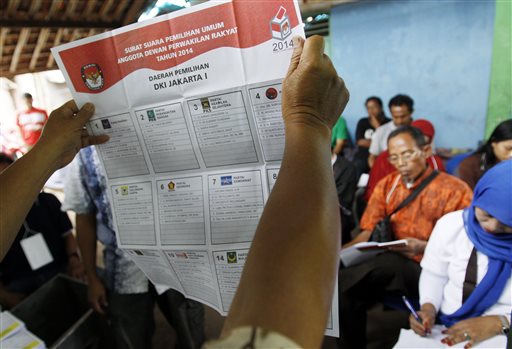
An election volunteer shows a ballot to witnesses while counting ballots for the parliamentary elections in Jakarta, Indonesia, Wednesday, April 9, 2014. Indonesia’s main opposition party won the most votes in parliamentary elections Wednesday, unofficial tallies showed, setting its popular presidential candidate, Jakarta governor Joko Widodo, on course to become the country’s next leader. AP PHOTO/ACHMAD IBRAHIM
JAKARTA—Indonesia’s main opposition party won the most votes in parliamentary elections Wednesday, unofficial tallies showed, setting its popular presidential candidate, Jakarta governor Joko Widodo, on course to become the country’s next leader.
However the Indonesian Democratic Party of Struggle’s (PDI-P) backing of around 20 percent was lower than expected, meaning the governor—a fresh face in a country dominated by figures from the autocratic Suharto era — may face a tougher than expected path to the presidency.
The 52-year-old former furniture business owner struck an upbeat tone nevertheless, telling reporters: “Thank God, the people have put their trust in the PDI-P.”
Support for President Susilo Bambang Yudhoyono’s party fell by about half after a string of corruption scandals, but backing for Islamic parties in the world’s most populous Muslim-majority country jumped—a surprise after polls predicted heavy falls.
Millions of voters earlier flocked to polling stations across the sprawling archipelago that spreads across three time zones, from mountainous Papua in the east to the crowded main island of Java to the jungles of Sumatra in the west.
Some 186 million people were eligible to vote for around 230,000 candidates competing for about 20,000 seats in national and regional legislatures, although the most important vote was for the lower house of the national parliament.
Key to presidential polls
Wednesday’s polls determine who can run in presidential elections in July and all eyes were on frontrunner Widodo and the PDI-P, which has long been tipped to win the biggest share of the vote on the back of the governor’s popularity.
The euphoria surrounding Widodo was illustrated earlier in the day when hundreds of journalists mobbed him as the governor, dressed casually in a white shirt and accompanied by his wife, voted outside his Jakarta residence.
Known by his nickname “Jokowi,” he is from a new generation of leaders in the world’s third-biggest democracy, which has long been dominated by aloof former military figures and tycoons dating back to Suharto’s three-decade dictatorial rule.
The heavy metal fan has been a political phenomenon since his meteoric rise to the capital’s top job in 2012. His common touch—he regularly visits Jakarta’s slums wearing a casual shirt and jeans—has won him a huge following.
Buoyed by his popularity, the PDI-P had long been ahead in opinion polls for the legislative elections, and the party extended its lead after nominating him for president last month.
An unofficial tally, known as a “quick count,” by think-tank CSIS, showed the PDI-P winning with 19.00 percent of the national vote, based on 98 percent of a sample of votes counted from around 2,000 polling stations.
A second tally by the Indonesia Survey Circle gave the PDI-P 19.67 percent. It was also based on 98 percent of a sample of votes counted from around 2,000 polling stations.
However, the result was lower than the around 25 percent predicted in recent polls and means the party may have to form a coalition with other parties to field Widodo as a candidate, instead of going it alone.
A party needs 25 percent of the national vote or 20 percent of the 560 seats in the lower house of parliament to be able to put forward a presidential candidate on its own.
“The party will be disappointed because they did not reach their projections,” said Paul Rowland, a Jakarta-based independent political analyst. However, he added Widodo’s huge popularity meant he was still firmly on course to be president.
Official results will only be released in May; however, “quick counts” have in the past accurately predicted the results.
Muslim parties’ success
In second place was the Golkar party, the former political vehicle of Suharto, with about 14 percent of the vote and in third place was Gerindra, the party of ex-army general Prabowo Subianto, a presidential contender seen as Widodo’s main rival, according to the tallies.
The big surprise of the day was the jump in support for the five Islamic parties running to around 32 percent from about 26 percent at elections in 2009, as their support had been expected to fall due to scandals and changing voter habits.
Whoever replaces Yudhoyono—due to step down after 10 years in power—will inherit tremendous challenges, with economic growth in Southeast Asia’s top economy slowing, religious intolerance on the rise and corruption endemic.
Despite fears of violence in some areas, the legislative polls—the country’s fourth since the end of authoritarian rule under Suharto in 1998—went smoothly in most parts of the country and there were few reports of disruption to voting.—Sam Reeves